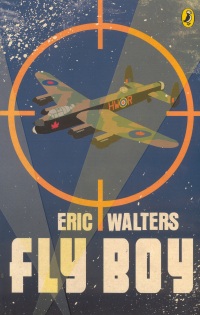| ________________
CM . . . . Volume XVII Number 31. . . .April 15, 2011. 
 |
Fly Boy.
Eric Walters.
Toronto, ON: Puffin Canada, 2011.
192 pp., pbk., $12.99.
ISBN 978-0-14-317630-5.
Grades 3-7 / Ages 8-12.
Review by Jonine Bergen.
***½/4
|
| |
|

excerpt:
I looked past Jed and Scottie, through the front of the canopy. There before us were pink pansies, a few scattered in a line and then hundreds of bright pink flares. Down below on the ground I knew there were German soldiers desperately scrambling around trying to extinguish them before we could use them for our mark. It was too late. They weren’t going to see what hit them.
“Opening bomb doors,” Scottie said.
Robbie McWilliams wants to be part of the victory against the Nazis. His father had served as a Spitfire pilot before he was shot down and became a prisoner of war, and now Robbie knows it is his duty to serve as a pilot as well. Unfortunately, his mother and his country do not agree with him that 17-year-old school-boys should serve. Determined, Robbie devises a plan to enlist early.
Using the birth documents of an older brother who died in infancy, Robbie becomes Davie and begins his journey through the basic training as an acey-deucey in Brandon, MB. While in Brandon, he learns that his dedication to his studies and his aptitude for mathematics have earned him a spot as a navigator on a Lancaster bomber in England. Although disappointed that his desire to become a pilot has been postponed, Robbie carves out a place for himself as part of the pathfinders, the group of planes that go first on a raid to mark the target for the bombers that follow.
Walters, a seasoned writer, has effectively evoked the mood of this time, both in Canada and in England. Narrated by 17-year-old Robbie, the story revolves around Robbie’s worry that his secret will be discovered and how he and his compatriots deal with the dichotomy of the everyday banalities of military life and the life-threatening midnight bombing raids they perform. Through Robbie’s progression of experiences, the reader is able to see Robbie grow from the youthful idealist who sees war as a heroic adventure to a young man struggling with the realities of death, loss, and human nature.
As with his previous works, Walters proves himself adept at portraying the reality of war without romanticizing it or being particularly graphic. His writing is spot-on for his audience; the battle scenes are suspenseful and the aftermath, reflective. However, Walters is a little too good at wrapping up his stories neatly, which ultimately does this topic a disservice. As Flight Lieutenant Philip Gray observes in the Forward, “While the majority of us were around the age of twenty-one, sadly fifty percent of us never lived to see twenty-two.”
As a side note, the students in my school have been researching our alumni who died in the Second World War, most of them as pilots. While reading Fly Boy, I was reminded of the many tidbits we have learned about these young men through our studies, particularly their time in Brandon. Although, their stories did not end as neatly as Robbie’s, their pride, hope, and sacrifice is respected in this telling. Fly Boy, would make an excellent read-aloud for classes working on similar projects.
Highly Recommended.
Jonine Bergen is a librarian in Winnipeg, MB.

To comment on this title or this review, send mail to
cm@umanitoba.ca.
Copyright © the Manitoba Library Association. Reproduction for personal use is permitted only if this copyright notice is maintained. Any other reproduction is prohibited without permission.
NEXT REVIEW |
TABLE OF CONTENTS FOR THIS ISSUE- April 15, 2011.
AUTHORS |
TITLES |
MEDIA REVIEWS |
PROFILES |
BACK ISSUES |
SEARCH |
CMARCHIVE |
HOME |
